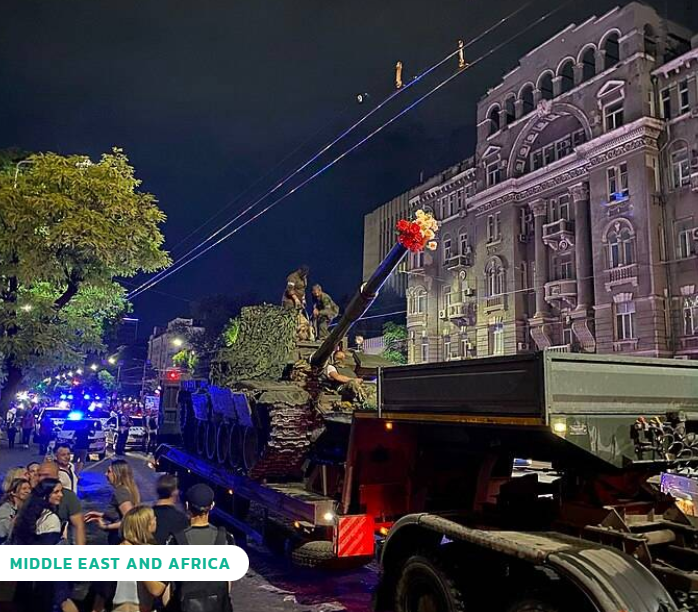Wagner Group’s Engagements in West Asia and North Africa. Wagner Group’s mutiny against the Russian military establishment and its sudden withdrawal in June 2023 have created chaos in Russia. This leaves analysts of Russian politics with several questions regarding the future of Wagner and the country’s internal dynamics.
Such questions have also been raised in countries where there has been active engagement by the mercenary group, especially in West Asia and North Africa. It is also believed that the group’s presence will be further weakened as Wagner’s operations in the region are largely believed to have been facilitated by the Russian state. This failed mutiny also holds severe implications for Russia’s policy towards the countries in the region.
The business model used by Wagner seems to have three elements, namely, military, economic, and political. In cases where the states had to turn to Russia for security, they ultimately welcomed Wagner for their military operations.
Wagner Group’s Engagements in West Asia and North Africa
Wagner later built its own economic networks to make money while also offering political services like disinformation campaigns in some African countries like Mali, Madagascar, and so on. In North Africa, Wagner has military and political influence in Libya. In West Asia, accurate data about the group’s presence is hardly known.
However, Syria is known to be the “largest base” of Wagner’s operations. Wagner makes its money through a network of shell companies in West Asia and North Africa by exploiting the natural resources like gems and jewels in Africa and oil and gas in West Asia.
Yevgeny Prigozhin, the chief of Wagner Group, allegedly said in a Telegram message that Wagner Group has carried out a “number of tasks” in West Asia and North Africa in “Russia’s interests.” Wagner aided rebel leader Khalifa Haftar in Libya. Mr. Prigozhin also has longstanding ties with the United Arab Emirates and Egypt, which the Arab countries regard as a way to please President Putin.
Wagner’s Presence in West Asia and North Africa
Wagner has a significant presence in West Asia and North Africa, specifically in countries like Syria, Yemen, Libya, Sudan, etc., where their primary job is to protect the emerging or ruling elites.
Libya’s geostrategic location, oil, and natural resources make it highly attractive to the Kremlin and its associated networks, like Wagner. Libya can also offer Russia an additional port in the Mediterranean apart from the Syrian facility of Tartus, which can help Russia compete with the United States and the North Atlantic Treaty Organization (NATO) forces in the region.
The Wagner Group started deploying its units in Libya in 2019. Wagner helped the warlord Khalifa Hafter gain control over some of the major oil fields in Libya. The group did not observe the regulations, such as the “arms embargo”, prescribed by the United Nations and associated agencies.
This was followed by Russia disavowing any responsibility it had for Wagner. The US had imposed sanctions on the Wagner Group and on individuals associated with the group. Despite the Western sanctions, the Wagner Group continued to undertake its covert military operations in Africa.
Haftar relied extensively on Wagner to establish and consolidate his control over parts of Libya. A sudden withdrawal of the mercenary forces, if imposed by Putin, would affect Haftar’s influence and have a serious security impact on the country.
The Wagner Group allegedly has close links with the United Arab Emirates too. Some analysts believe that Russia depends on the UAE to enable Wagner’s operations in Africa. Wagner’s chief, Prigozhin, shares a good relationship with the UAE. However, following Wagner’s mutiny in June 2023, questions arise about whether Russian President Putin will put pressure on the UAE to “clamp down” on Wagner.
Read more at thegeopolitics.com
Photo: thegeopolitics.com


Leave a Reply